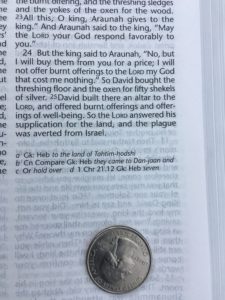John MacArthur preached a sermon a few weeks ago which might best be summarized as “Biden is in the White House, homosexuality is on the increase, America is now under irrevocable judgment, film at 11.” And I was basically content to leave my understanding of his remarks at that. But, after talking to a friend of mine, I was compelled to engage in a little self-flagellation so I listened to the whole one-hour speech. (My friend says a two-hour version is out there. I shudder to think.)
A few minutes into this ordeal, MacArthur was taking so many verses out of context that I wound up pulling out Bibles and commentaries that hadn’t seen the light of day for quite some time. I soon had our living room cluttered with a slew of study Bibles, commentaries, and various translations. Never let it be said John MacArthur doesn’t provide motivation for the progressive Christian.
MacArthur’s main idea was to join in the culture wars and somehow say that America under Biden is more corrupt than Trump’s America. In an effort to prove his point, MacArthur doesn’t waste time in getting to Romans 1:18-32, one of the most beloved clobber passages. He then covers the same stuff we’ve always heard about people knowing there is a higher power than themselves but refusing to acknowledge that truth so God gives them over to their own desires.
He uses Romans 1 in conjunction with some passages from Isaiah to say that there are three signs of a nation being abandoned by God: a sexual revolution, a homosexual revolution, and being given over to a depraved mind, i.e., insanity. MacArthur doesn’t say much about the sexual revolution but I assume he thinks there’s a homosexual revolution coming to fruition under Biden. MacArthur may not be aware of this but LGBTQ folks have been around since before November 2020. Spread the word. In something of a twist, though, he equates being transgender with having a depraved mind. Not only are transgender people nuts, they’re beyond redemption. MacArthur is apparently laboring under the delusion that being transgender is a choice. It’s not. Once again, someone should let Mr. MacArthur know that gender dysphoria is an actual thing that was diagnosed prior to January 2021.
Here’s the thing about Romans 1, though: it’s not the blanket condemnation of homosexuality I was always told it was. It’s talking specifically about idol worship. Take a look at verse 23 that says “(they) exchanged the glory of the immortal God for an image resembling mortal human beings or birds or four-footed animals or reptiles.” Paul is contrasting idol worship (almost exclusively associated with the Gentiles in Paul’s time) with the sins of the Jews in an effort to show that all of us need redemption. The list of unrighteous acts at the end of the chapter were associated with recent Roman emperors around that time.(Paul is also using quite a bit of language from The Wisdom of Solomon 13:1-9 (a passage describing Gentiles worshiping the creation instead of the Creator) in an effort to drive his point home.)
And this is without even considering the very real possibility that Romans 1 was meant to be heard as the voice of a “false teacher.” Here’s the thing, way back in the day, there was a form of written argument called prosopopoeia. It’s an ancient literary device that can be briefly described as an extended rhetorical question summarizing your opponent’s arguments followed by your answer to that question. Using this format, 1:18-32 are in the voice of the false teacher and Paul answers in 2:1-5. A good video series on Paul’s use of prosopopoeia starts here.
Honestly though, if you feel the Bible prohibits homosexuality and there’s just no way around it, I suggest you meet some gay people who love Jesus. Go out of your way to get to know those in the LGBTQ community who identify as Christians and see for yourself where their hearts are. A lot of these people were raised up in church and have tried to “pray the gay away” for years with no success. They were told their orientation separated them from God, that they were fundamentally evil, or, like MacArthur says, that their mere existence is a sign of God’s judgement on America. Then you get to choose what you’re going to believe: your interpretation of the Bible or the truth exhibited in the lives of these people who love Jesus and seek after Him despite what their churches have told them.
Well, this entry has gone on for longer than I meant it to and I still haven’t gotten to the awesome surprise I found in one of the Isaiah passages MacArthur referenced. It really was a neat find for me and I have Mr. MacArthur to thank for the motivation to dig deeper. More on this later.




